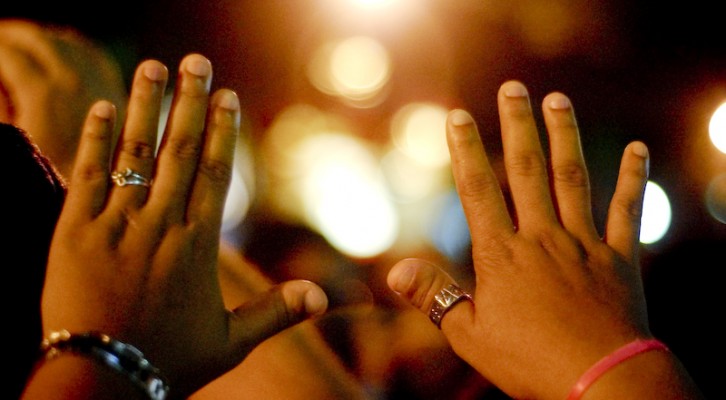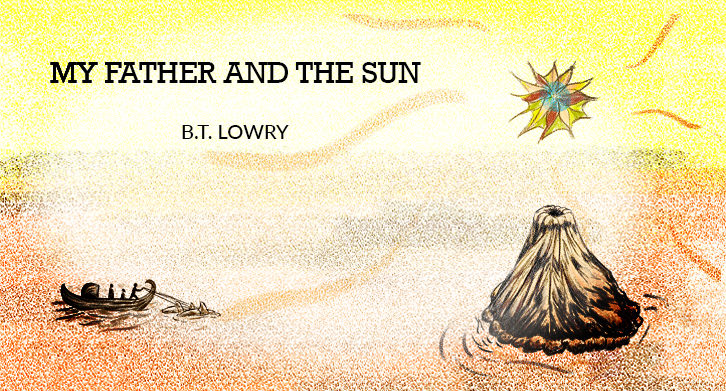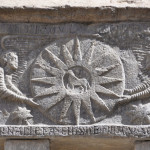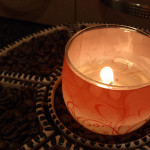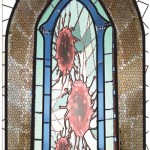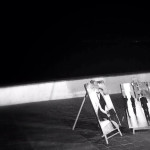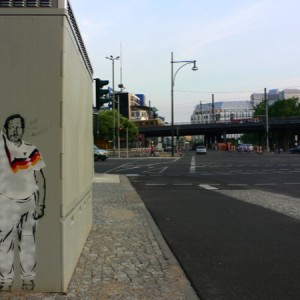Meeting Kevin’s parents for the first time, Greta was at once sure — or almost sure — that she was right.
“A monk!” Kevin’s mother Gloria had whispered in the kitchen. “Can you imagine? Raised as an Episcopalian, and he wants to be a monk. Why on Earth?” She sighed and handed Greta a serving plate loaded with bread and cheese. “We’re going to be so happy to have you in the family, Greta. So happy. At least Kevin has some sense left in that esoteric head of his.”
Balancing the tray on her forearm, Greta headed toward pine-paneled family room where Kevin and his father were drinking coffee. Kevin’s parents didn’t know about the baby; they were going to wait until after the wedding to tell them.
This revival you’re going to,” Kevin’s father asked, “is it for your studies?”
“In a way,” Kevin replied.
Kevin’s dissertation was a study of religious service performance, and he’d been to very few churches other than the sangha he attended weekly. He needed to do some research fast to get material for his writing. His father didn’t know how far behind he was, and Kevin didn’t want to let on. They waved everyone off with big smiles from the Volkswagen as Kevin back out of the driveway.
“I feel bad leading them on like that,” he said.
“Don’t worry,” she told him.
Greta gazed out the window as Kevin drove deeper and deeper into the country, weaving the car down the slim road running between the tobacco fields.
She and Kevin had met the year before at a meditation group. He was a PhD student from the religion and philosophy department. Greta had been instantly intrigued. She thought he was beautiful, with his gold hair, his tall lanky frame, the pale, thin lips, and most of all, his light green eyes and the expression inside them — cool, determined and serious. Later she would learn that he wanted his eyes to look warm, calm and peaceful, “full of love, real love,” he’d told her. But Greta doubted if that would happen; it wasn’t possible for people to change the important things about themselves, and eyes were the most important of all.
Greta’s eyes were brown and steady, and she was much shorter and sturdier than Kevin. When they walked together, he hovered above her like a giant, and people who saw them often smiled in amusement. They were a mismatched couple, but a right couple, Greta was sure, because their spirits had something in common. In the meditation group, Greta had impressed Kevin because she could twist her legs into a real lotus position and hold it there for more than an hour. People always said she should train to teach yoga, but didn’t really care about stretching herself out into strange positions. Besides, she was busy with her job teaching computers at the community center. But now, with being pregnant, she might sign up for yoga anyway — after the wedding.
The car’s right tire hit a bad bump in the road. “You OK?” Kevin tenuously removed a hand from the steering wheel to stroke her thigh.
“Fine,” she said.
“We’ll be there soon,” he said, and replaced his hand on the steering wheel.
Greta had told Kevin about the baby two weeks ago, on the day she had found out. There hadn’t been time to waste. Kevin had already been packing to leave for India . A suitcase loaded with all his books, papers, and CDs was lying open on the floor of his bedroom when she’d gone over to tell him. They sat together on his futon, shoes off, legs crossed, him knowing by her expression that something of great importance was about to be revealed.
“I’m pregnant,” she said, exactly as she had practiced since leaving the GYN clinic a couple of hours before.
Kevin was shocked, as expected. “Pregnant? With a baby? But what about, what about — I thought you were on the pill.”
“It doesn’t always work,” Greta replied. She had practiced this part too. “The pill is only 99 point seven percent effective. There’s always that three tenths of a point. It got us, Kevin.” She leaned back against the wall, thinking that now would be a good time to light a cigarette. But she did not smoke anymore.
“Three-tenths of a point,” Kevin repeated. His face went limp.
The truth was that Greta had stopped taking the pills when Kevin had suddenly announced that he was leaving “the ways of the flesh” to write his dissertation and practice austerities in India . She couldn’t let him go, and being pregnant was the only way she could think of to get him to stay. She saw no good reason why he should leave. America was full of interesting religions to study. Bookstores abounded with every Buddhist text, and there was even a temple right in Chapel Hill . He was being idealistic — no, ridiculous. What if he left and never came back? She couldn’t take losing him, couldn’t take the idea of him starving on a mountain, bald, with no one to bring him back to real life, real love. So she had thrown her birth control pills away and bought a bag of pot from her younger brother Sean — Kevin couldn’t resist sex when he was high.
“We’re here,” Kevin said. He steered the car into a gravel parking lot.
The church was an elongated white brick building situated at the meeting point of two dirt roads. The windows were lit with lemony light, and the front door was curved at the top like a fan. “Ohhh,” Greta said. “It’s so pretty.” Lately she had found herself interested in architecture, so much so that she was always looking upward when walking down the street, and sometimes bumped into strangers. Small details excited her: a peak in a roof, a round window, a weather vane, the gargoyles and cherubs carved in the corners of the older buildings in Raleigh. The church’s simplicity was as exciting as anything she saw in the city, even more so, because it looked as if it hadn’t built as a church, but as a non-religious meeting house, or maybe a grange. There was no steeple coming from the roof, no stained glass windows, not even a crucifix on the door. Just a plain square white building, full of a mystery that Kevin was intent to solve.
They parked in a small gravel lot in the front of the church. Kevin turned off the car and placed his small voice recorder in his shirt pocket. He was going to tape the entire service. “Someone, at least one person, will be saved,” he’d said earlier. Greta had never gone with him into “the field” and considered it something of an honor. Now that they were engaged to be married, he was including her in his life in a way he’d not done before.
Overall, he had taken the news well. After the initial shock, he’d come to her. “Nothing could be more spiritually rewarding that to bring life beyond your own self,” he’d said. “And I think we should get married and have the baby. I’ve decided not to go to India after all.”
As they embraced, Greta had felt her first tinge of guilt. She had known all along that Kevin would never ask her to have an abortion. She didn’t bring it up, and neither did he. Greta and her mother looked for a dress and picked a caterer. All the while, Greta felt more and more guilty. Twice she called the abortion clinic, hanging up the first time, and asking about the cost on a second. It would be easy to tell Kevin that something had happened. The pregnancy was so early yet, and something very well could happen, which made her feel all the worse. What she had done was wrong, and now she should have an abortion and buy Kevin a ticket to India . But the mere thought of doing either of those things caused her to wither inside. She loved him, and could not let him go.
The church smelled like floor cleaner and candle wax. The organist — a stout, wrinkled woman with gray hair puffed into a hairsprayed mound — was tuning her instrument; the off-key whines blended into the mull of conversation and shuffling feet. The walls were painted a bright, spotless white, and a large oil-painted portrait of Jesus Christ hung above a little mahogany table. On top of the table were stacks of paper booklets and an arrangement of yellow and red silk flowers.
Greta and Kevin had just taken a seat side-by-side in the back pew when a man approached them. Kevin immediately rose and offered his hand. “Kevin Snyder,” he said, leaning over Greta’s lap. The man’s weed-brown mustache was gray in the outside corners, and his black hair clashed with his cloudy-pink skin. His clothing — a thin white cotton shirt and brown slacks — was as downtrodden as the rest of him. The shirt was tight in the armpits and wrinkled at the collar.
“Reckon you’ll need a hymnal,” he said, and extended a blue cloth-bound book, which Kevin accepted. “I’m Benjamin Duras,” the man said, “the church pastor, or one of them, that is.”
“And the others?” Kevin asked.
Duras pointed out an elderly, white-haired man at the front of the chapel who was slowly ascending the wooden platform. “Right there is my father, Pastor Benjamin Duras the first. And over there,” he gestured toward another man who stood among a group of people near the entrance, “Is our visiting minister, Jack Hutchinson, here on his tour, called the New Vision.”
At that moment the organist pounded out the first notes of a carnival-like melody. Duras nodded to Greta and walked off toward the platform. Everyone hurried behind the pews. As the singing began, both Kevin and Greta were hunting through the hymnal’s onion-skin pages. Everyone else knew the words by heart. After the first, another hymn was sung, and Greta did not search for the lyrics, but just listened. The organ and the voices gave her spine a chill. She drew in her breath and closed her eyes. She’d not expected this.
When the music ceased, everyone lowered into the seats. The older white-haired Pastor Duras took the stage and raised his hand in the air. It was a cue for prayer. Greta bowed her head but kept her eyes open and focused onto the tile floor. She had not been to church in about five years, not since her grandmother’s funeral. Her family was Presbyterian and only went to mass for funerals, weddings and christenings. Greta’s religion was self-made, and she didn’t feel a need to study the topic in-depth. Kevin was obsessed enough for both of them.
The pastor began to read from the Bible.
Greta glanced around at the church’s patrons. Many were women her age, in their twenties, and were shushing rosy-cheeked children. Some of the women were plump, others thin, but almost all of them were wearing make-up and dresses. A few were even in nylons and high heels. Greta was wearing clogs and a wraparound skirt with her white sleeveless sweater. Even in this, she was sweating. Directly in front of her were two old black ladies. Both cradled wide-brimmed flowered hats in their laps. One lady’s hair was twisted into feathery ringlets. Her companion’s steel-gray hair was gathered into a black webbed hairnet.
Men of varying ages, many of them with mustaches and wilted clothing similar to the younger pastor Duras’, were seated randomly throughout the congregation. To the left of Greta’s pew was a group of three young men. The oldest was probably about twenty. All three of them had hair to their shoulders, and wore polished leather vests, cowboy-style neckties, and shiny belt buckles.
Behind them was the visiting minister Jack Hutchinson. Greta found him to be a reasonable looking man, not thick-haired or overweight like the TV evangelists she had seen while flipping channels on Sunday morning. His eyes were quite attractive, she thought. They were bright blue, but not fiercely so. If he were younger and slimmer he would have looked something like Kevin.
Kevin was absorbed in the old pastor’s eulogy. The tape recorder sagged in his shirt’s pocket. If she shifted in her seat, she could see the “record” light glow. What would people think? Kevin caught her eye, and she motioned to his pocket. He looked down and readjusted it so the light was not visible. Greta caught his eye again and smiled.
She was remembering the first time they had kissed, after one of the meditation sessions at the group house where Kevin lived with two other students. The two of them had gone upstairs to his bedroom during the meeting. Everyone else was still downstairs, talking about upcoming meetings and a possible silent retreat. The sun was just going down in the November sky, and a gray-blue light bathed the lumpy objects on Kevin’s bookshelves and chest of drawers. His futon was spread out in one corner, heaped with a crumpled Mexican blanket, four books turned face-down and a box of tissues smashed on one side. Three cups half-filled with water lined the edge. They avoided knocking them over as they sat down together, legs spread out, backs against the wall. Kevin took her hand. “I couldn’t meditate,” he whispered, stroking his thumb inside her palm. “I was thinking about you.”
“But you’re not supposed to be thinking,” she said, teasing.
“I know,” he said, leaning forward. His breath smelled like anise.
Greta surveyed the congregation. She focused upon a teenage girl on her left, who was small like a child but developed in the hips and breasts. The girl’s gold-brown hair was held in place with a silver barrette, and her face was broad and patterned with freckles, her eyes — from what Greta could see — jade-green and bright.
The organ blared as the old pastor concluded his reading. When the younger Duras took the altar, a shuffling restlessness simmering in the crowd. It seemed he was not as highly regarded as his father.
“Tonight,” he said, “each of you will be given the chance to make a home with God and his blessed Son.” Duras gestured to the back of the room, where Hutchinson was now standing. The three young men were now standing with him. “Reverend Hutchinson is going to come up here to talk to you all. Now I know that many of ya’ll are good Christians who work each and every day to rid yourselves of sin.” A chorus of amens came out from the crowd. “But I’ll tell you here and now that each and every one of us can make more room for Jesus.” A pause. “Cleanse your souls, my friends. Open your heart to Jesus,” he said. “The blessed and holy son of God,” the organ bleated under his words. The old ladies were rocking back and forth; each of them raised their hands above their heads.
Duras hesitated; the music lowered to a whiny thread. “And now, folks,” he said in a near whisper, “please welcome Jack Hutchinson and his tour of New Light.”
Applause rose from the crowd as Hutchinson headed toward the stage. His jacket slapped his hips. Once he was behind the podium, the audience fell quiet.
“My friends,” Hutchinson said, as a statement in itself. “Your choice to come here this evening will take you far onto the path of spiritual and holy love.” Once again, a chorus of amens lilted from the crowd. Kevin was absorbed in the scene. “Now some people tell me that they are afraid to get saved,” Hutchinson said. “But you got to remember that gravity won’t pull you down if the hands of the good Lord are beneath you. And God provides those hands, my friends. Let me introduce them to ya’ll right now.”
The organ wailed as the three young men stepped toward the front of the stage. They lined up directly below Hutchinson, faces somber. “Here they are, ya’ll,” Hutchinson continued. “These are the hands the Lord has provided us with tonight. Hold out your hands, ya’ll,” The three men each extended their hands. “Names are Joe, James and John. And don’t they look like they could hold up an elephant?” A rousing applause affirmed his question.
The organ halted as Hutchinson repositioned himself behind the podium. “Brothers and sisters,” he said. “The world is full of tragedy. Just watching the evening news on TV is evidence enough that the devil and his workers are out there. And more and more people are going against the Lord.” The congregation fell silent with reverence.
“Come up, my friends,” Hutchinson said. He paced back and forth on the platform, his glossy black shoes thumping. “You don’t want the devil to bring you down. Turn yourself over to Jesus.” Without a moment’s hesitation, three people left their seats, scurried to the stage, and knelt onto the floor. The teenage girl was one of them. Two of the three young men joined Hutchinson on the platform. “Now,” he said, waving his hand over the tops of their heads “you folks have made the right choice, the only choice to go with the Lord. Come on up here,” he waved his hand again and the third man helped an old woman to her feet. She joined hands with Hutchinson as she stepped onto the platform. The organ music softened. “Tell me, Sister,” he said, “what brings you to Jesus?”
“I have cancer and want to be healed,” she said, her words crackling, she raised her chin toward the ceiling. Hutchinson placed the palm of one hand in the center of her forehead. “Jesus be with you,” He said, and the women fell back easily into the arms of the two men.
The teenage girl was the next to stand before the crowd.
“Sister, what’s your sin?” Hutchinson asked.
“I’ve never been saved before,” she said. Her voice was scratchy and hardly above a whisper. “My family ain’t Christian,” the girl continued. “But I want to get saved anyway.”
“Amen,” said Hutchinson.
The girl turned toward him and closed her eyes. Her brown hair brushed her bare shoulders; the barrette was sliding free. She bent her knees slightly and raised her arms out in front of her, as if she was about to turn a back flip. Hutchinson lifted his hand with a flourish and knocked her forehead with the heel of his palm. The girl did not budge. She opened her eyes and looked directly at Hutchinson.
“Girl, what do you want?” he asked, leaning in close to her face. His eyes were lighter than they’d been before, as if anger, or rage, or whatever emotion he was conjuring, drained something from them.
“I want to love Jesus,” she said, choking a bit on “Jesus.”
Once again, Hutchinson knocked her forehead with his palm. This time, she fell backward smoothly — deliberately — into the arms of James and Joe. They gently slid her body to the floor, where she curled up into herself, covering her head with her hands and forearms.
An exhausted-looking man had taken the stage, and was down on his knees. “I told my wife I’d be coming here tonight,” he said. “I’ve got to change my life around, and befriending the Lord again is how I’m going to do it.”
All at once, Greta was overcome with nausea. She gasped and covered her mouth with her hand. “I’m going to the bathroom,” she whispered to Kevin’s ear. He gave a short nod, his eyes transfixed on the stage.
The ladies’ bathroom was surprisingly large, holding two blue-painted booths. Greta slipped into one nearest the opened window, hung her purse on the door’s hook and clicked the lock. For a moment, she simply wrapped her arms around herself, gazed up at the rust-spotted ceiling and breathed deeply. The nausea had subsided, but her heart was beating faster than normal and a sweat had broken out on her forehead. She moved one hand to her abdomen, to the spot where the baby must be. Not really a baby, she reminded herself, but a thing, a thing she’d decided upon, a thing she had control over.
The shame of these thoughts might have been too much, because the nausea hit again and she lurched forward, vomiting into the toilet bowl. When it was over, she sat up, wiped the water from her eyes, her dripping nose, and whispered, “OK, you win,” and then laughed softly at herself for talking to no one. But then she stopped laughing, because there was someone: the baby.
She left the bathroom stall and stopped to look at herself in the mirror. Her hands shook as she ran them over her hair, trying to straighten it and tuck loose ends back into place. Kevin was wrong, she decided. It was her who was teaching him, not the other way around. Getting pregnant, as somewhat-deliberate as it had been, had still been a card of fate, and his contribution could not be ignored. It had been him as much as her, and she would not feel guilty any longer.
Reentering the chapel, she saw Kevin on stage. She stopped at the end of the aisle, frozen in the spot.
“Brother, what’s your sin?” Reverend Hutchinson was asking.
“My sin,” Kevin cleared his throat, “is that I want to keep away from the people who love me. That even though they love me, I can’t really be with them. But now, because of something that happened,” he paused and bowed his head, “I now have to stay. And I want to. It’s just that I can’t get rid of this desire I have to leave.” He raised his head, looking directly at Greta.
Greta grasped the side of a pew, fighting a second wave of nausea. Her knees went weak, and she felt herself sliding onto the floor.
“Lady needs help,” she heard Hutchinson call out. The audience responded with a few amens, and Joe, James and John rushed to her, taking hold of her body by the backs of her arms. When she was on her feet again, she felt Kevin’s eyes upon her. Meeting his gaze, she saw the hint of accusation he was holding stiff in his stare.
“Don’t blame me,” she said to him.
“There’s no blame in the eyes of Jesus,” Hutchinson said, walking toward her. The glint in the reverend’s eyes revealed that he’d noticed her from the beginning.
“Tell us, Sister,” he said. “What’s your sin?”
author
Anne-Marie Yerks is a graduate of George Mason University’s MFA program in creative writing and has been published in So To Speak, Bust, and other publications.
photo credit: <a href=”http://www.flickr.com/photos/brenopeck/1574759464/”>Breno Peck</a> via <a href=”http://photopin.com”>photopin</a> <a href=”http://creativecommons.org/licenses/by-nc-sa/2.0/”>cc</a>

